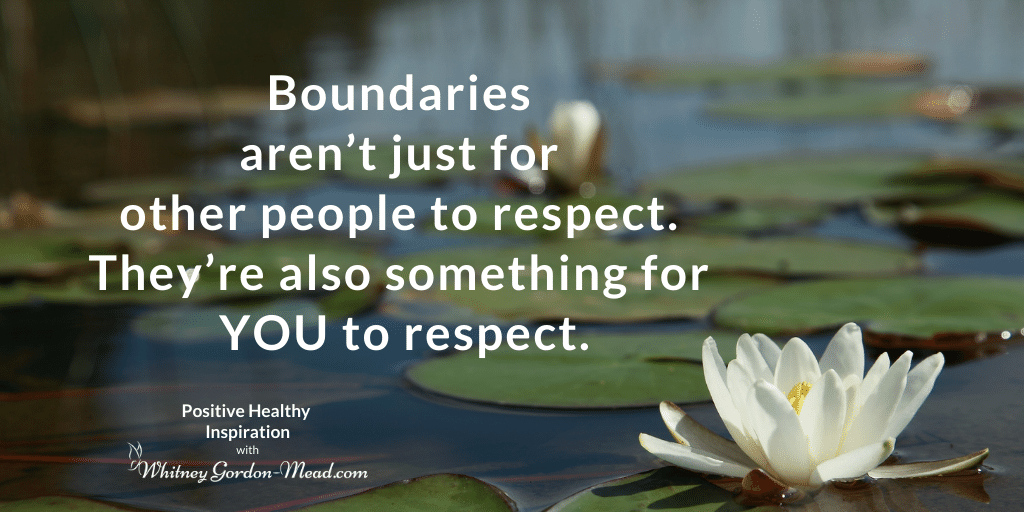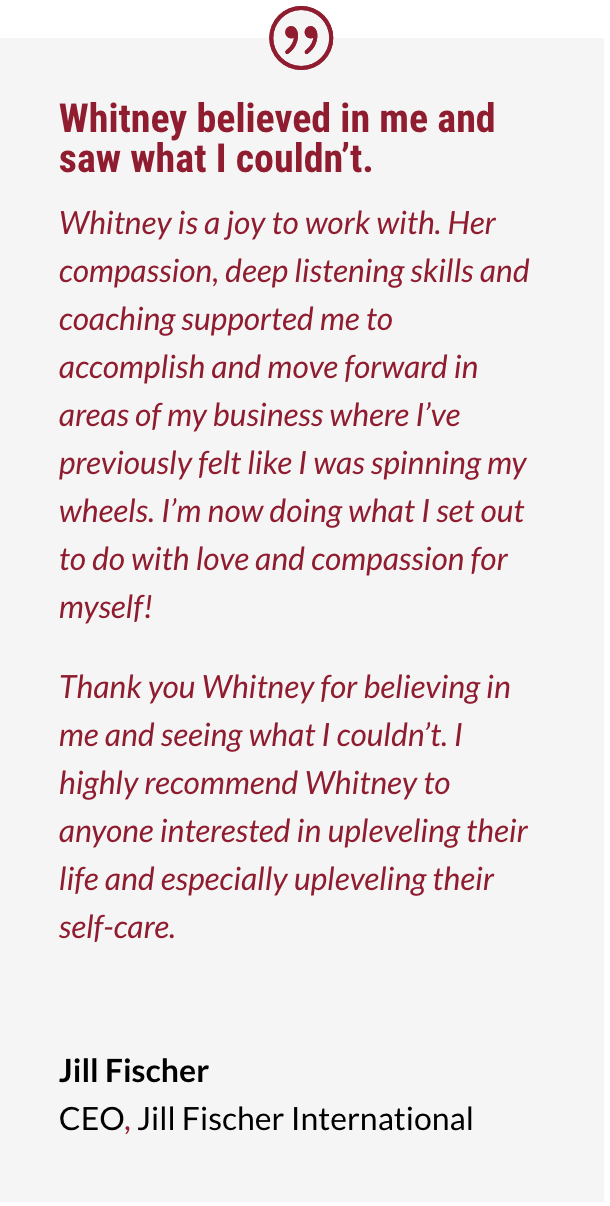I can do it myself.
How many times do you tell yourself this — even when it feels like you’re drowning in overwhelm and endless responsibilities?
Sometimes you push yourself to your limits because you feel like you’re advocating for your power and independence. But here’s what happens:
You try to quietly power through your exhaustion. You stay and work late, overextending yourself. Tasks pile up, your priorities fall through the cracks and then you’re left picking up the pieces…
See, advocating for yourself isn’t about showing yourself that you can do it all.
Advocating for yourself is about realizing when you need support and asking for what you need. It’s about feeling comfortable with telling yourself, “I can’t do this alone. I need more support” and then asking for what you need from those around you.
But communicating your needs to others can feel like the hardest thing to do.
Why is this?
Perhaps, you avoid asking because you fear judgment. Or you’re a people-pleaser and don’t want to “rock the boat”. Or maybe it’s because you don’t want to feel exposed and vulnerable.
Getting Comfortable With Vulnerability
Asking for what you need leaves you open to rejection and criticism.
The other person might say no.
They may even judge you, just as you feared.
But some will say yes.
And those who do are the people with whom you build powerful support systems. You give and take and share with each other, creating beautiful life-long relationships in the process.
When you self-advocate and ask for support, you are practicing self-love.
Because you care about yourself enough to get help when you need it, instead of letting yourself shoulder the weight of the world alone. And you will learn that other people actually want to contribute to you.
But what would happen if you tried to do everything alone?
What Would Happen if You Didn’t Speak Up?
The consequences go beyond your needs being unmet.
Let’s say you’re unhappy with how you and your partner communicate. When you share a frustrating experience, your partner immediately goes into problem-solving mode. Yet, all you want is someone to listen and empathize.
Yet, you don’t speak up about how you feel.
Over time, you feel resentment. There’s a disconnect between what you desire (empathy) and what you’re receiving (solutions). And you feel frustrated because you’re not honoring your needs and being authentic with your emotions.
See, we often stay silent because it feels easier… in the moment.
Yet, if you ignore your needs and let your problems fester long-term, they can lead you to feel isolated, alone and unsupported.
4 Tips to Help You Ask for What You Need
Instead of struggling alone with the weight of the world on your shoulders, ask for support. You may be surprised to learn that other people want to help you succeed and thrive.
Following these four tips will help you break the silence, ask for what you need, and finally respect your well-being.
#1 Stop Asking If You “Deserve” What You Want
One reason why you might refuse to ask for help is because you feel undeserving.
You don’t think you’re worthy of help or affection.
I’m here to tell you that you have incredible self-worth and that you deserve to claim a life where you feel heard, respected, and loved.
If you need more support from your partner when you’re feeling overwhelmed, ask for it. Don’t feel like you need to “deserve” it before you can make such a request.
If you’re overextended at work and need a personal day, ask for it. Preserving your health shouldn’t be something you have to question.
You deserve it.
#2 Create and Respect Your Boundaries
In Psychology Today, F. Diane Barth L.C.S.W. said, “Boundaries represent your values and beliefs.” Thus, the first step to creating healthy boundaries is to identify your values and priorities.
Your values and priorities lead you to manifest the life you desire. They also set natural boundaries — things and activities that are aligned with your values and priorities.
Let’s say you want to make quality time with friends and family a priority. If you’re burning the midnight oil at work, then your actions are incongruent with this priority.
See, boundaries aren’t just for other people to respect. They’re also something for YOU to respect.
Asking for what you need isn’t something you only ask of others. It’s also something your values and priorities ask of YOU.
Asking for what you need isn’t something you only ask of others. It’s also something your values and priorities ask of YOU. Share on X#3 Be Assertive When Communicating Your Needs
When asking for what you need, you might feel embarrassed.
Instead of clearly stating what you need, you may hide your request in filler “pleasantries”:
- When you have time, could you…
- … but only if it’s not too much of a bother.
- I know you might be busy, but…
You might find yourself doing this at work when asking something of a co-worker or communicating with a superior.
Yet, what you’re communicating is that your needs are secondary and can be attended to “when they have time” or if “it’s not too much of a bother.”
However, your needs are essential, just like anything else.
If something is not working for you, communicate it clearly: I’m feeling this way. And I need this to help me feel better or resolve this challenge.
#4 Learn When to Ask for Help
If you struggle with being able to fulfill your priorities and honor your needs, you may need to rely on your support systems.
Instead of shouldering everything yourself, you can ask for help.
If you feel yourself burning out, you can ask your children to pitch in more with the house chores. Or you might want to talk to your boss about taking a few personal days to heal your body and mind.
If you have the resources, you can hire some help. For example, you can sign up for a food delivery service or pay somebody to regularly clean your home — even if it’s just once a month, it can make a difference.
Asking for help lessens the amount on your plate and frees up your time so you can do what’s truly important…
Enjoy life, honor your needs, and fulfill your goals!
Are You Able to Ask for What You Need?
You may tend to hold your needs close to your chest and hide them from the world.
But, if you hide your needs and don’t communicate them, other people won’t know how to support you.
It’s possible that you do this because you feel a sense of shame. You don’t want to ask for help because you think this will appear as weakness. Perhaps you’re afraid it’s an admission that you’re incompetent.
If these thoughts cross your mind when you think about seeking support, you may be dealing with limiting beliefs.
This may surprise you.
Asking for help requires self-awareness and self-confidence that may feel uncomfortable.
Special note: I’m so excited about my brand new 6-week online group coaching program for women to go From Struggle To Ease! It begins on Monday November 9, so make sure to act now.
During this group program, you’ll have the opportunity to experience the powerful cutting edge tools that have allowed me to let go of struggle and live without stress and overwhelm!
As a result of taking this program you’ll experience a life-changing transformation. This means that you will…
- Enjoy increased peace of mind by quickly dissolving conflict, upset, and intense experiences.
- Access more energy and enthusiasm for your business than ever before.
- Achieve your goals more quickly and easily.
- Say YES to yourself and what matters most, rather than the stuff that over-extends you.
- Have greater ease and flow in your relationships, work, finances, health, and more.





